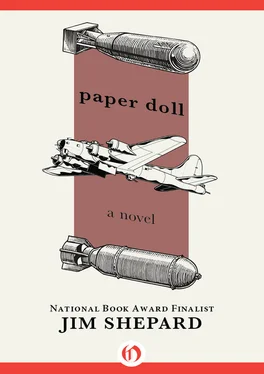His interphone was unplugged and he had no warning of bombs away. They shifted and dropped from sight in a single spasmic load and the whole ship rose beneath him from the enormous loss of weight, the horizon through the bomb bay doors ducking and sweeping upward.
Below them the first salvoes were hitting and he could see each as a rapid series of flashing bursts turning dark red and then black as the smoke billowed and mushroomed like underwater murk.
He watched longer than he should have before climbing back into his turret and strapping himself in.
They were turning, flying in circles around the flak while they waited for the hundreds of B-17’s following to bomb. Bryant was not a bomb jockey but he had the feeling that their bombing pattern had left a good deal to be desired. He plugged in his interphone cord.
Gabriel was telling them all to look. Bryant imagined him grabbing Cooper’s arm, pointing to the bombing pattern. “Willis! Mr. Eddy!” he said. “What do you think? Are they nailed or are they nailed?”
“Hard to say, sir.” Eddy was cautious. “ Some body was way off. See all that stuff to the north?”
“I hope we got an orphanage,” Lewis said from the back. “Kids with toys in their tiny hands.”
They maintained a steep bank, Bryant’s knees against a shell chute in the turret. “I don’t think we hit anything,” Eddy said glumly after a pause.
No one commented. Whatever had happened was no one person’s fault and there were more than enough extenuating circumstances. “So much for pickle barrels,” Piacenti commented.
Archangel was pulled in tight behind their starboard wing, and Plum Seed was drawing closer on the opposite side. The flak stopped abruptly, the sky sweeping clean ahead of them, signaling the onset of fighters, and through the charging of the guns Snowberry asked over the interphone in a small voice if they were going to be leaving anytime soon, and if so, when.
It became quiet. The flak had seemed harmless, defensive gestures the Germans only half meant but felt they should make. They flew north and west, for the Rhine. The plains gave way to hilly wooded areas dotted with orange and yellow.
“You guys should see the foliage,” Snowberry said. “In August, yet.” They could hear him rotating his belly turret.
Hirsch wondered aloud if they were exactly on course. Bryant knew that he considered himself privately to be the equal of the lead navigator. As far as Bryant understood, he was alone in that view.
“In my opinion,” Bean ventured in a shaky voice, “this was an extremely difficult mission.” He had been quiet so long Bryant for one had forgotten about him.
“Bryant,” Gabriel said. “Eddy’s gun.”
Bryant pushed the interphone to Call, embarrassed. He had forgotten. “Eddy,” he said. “Is it burned out?”
“It’s just sticking.” Eddy grunted. “Goddamn thing almost got me killed. I’m pointing it like it’s a magic wand, like it’s going to do something.”
“You keep swiveling it around, even when it’s out,” Gabriel said. “You let it hang down and it’s the dinner bell.”
“I’m not stupid,” Eddy said. His Gary Cooper voice had returned to maintain dignity but he sounded hurt.
“Try playing with the retainer on the solenoid,” Bryant said. He waited.
“Yeah,” Eddy finally said. “So what? Wait. Hirsch’s got pliers.”
“Make sure he keeps his gloves on,” Gabriel said. “Or doesn’t have them off for long.”
“I think it’s working,” Eddy said. “Who’d a thought it?” Bryant was relieved and proud and thought, Who ’s not a good flight engineer?
“You know the force is split,” Lewis reported from the back. “The second combat group has to be fifteen miles away.”
“Maybe our group broke too soon,” Gabriel said. “Maybe we got a chicken colonel.”
Bryant turned his turret to the rear. The other group was a pattern of staggered dashes, just visible flying through intermittent cloud.
“Someday they may know what they’re doing in this war,” Lewis said. “Right now they have only the slightest fucking idea.”
“Does anybody know how many we lost?” Lambert Ball asked. He, too, had been quiet.
“Everybody shut up,” Gabriel said. “No more casualty lists. We got enough to worry about.”
They could hear from the tail Lewis counting softly, the numbers just whispers, counting with the interphone on. Piacenti crawled to all the gun stations with a walk-around oxygen bottle, divvying up whatever ammo was left. Bryant showed him how to feed the coiled belt he’d brought into the turret, and when they were set, Piacenti made a circle with his thumb and forefinger and disappeared.
The front of the plane was silent. Eddy and Hirsch in the nose, Gabriel and Cooper in the cockpit, and Bryant on top were searching for fighters. Ahead of them lay the corridor of their losses on the way in, the fires still burning and visible beneath the columns of climbing black smoke. They passed into it.
“It’s like training, in Florida,” Eddy murmured. “Navigating by beacons at night.”
They all recognized the similarity. “We could follow these home,” Gabriel mused.
“This stinks,” Snowberry said. “We shouldn’t have to do this.” The port wingtip brushed through one of the smoke columns. They seemed to be only creeping along, as if flying into a terrific headwind. Snowberry said, to himself, “I’m only seventeen years old.” Someone asked testily why they were dragging their ass.
“Look at them all,” Snowberry said. His voice was filled with regret.
“Keep watch ahead,” Gabriel said.
Snowberry said, “You know, it’s like you expect guys to get it. But not so many. Not everybody.”
“We’re comin’ up on the Rhine,” Hirsch announced.
Bryant turned his turret a final time to the rear, gazing back at the tall anvil of black smoke over Schweinfurt, now fifty — sixty? — miles back.
“Dots. Bandits. Fighters,” Eddy called. The dots in the distance spread into even lines, and they knew they were in for it again. Bryant had gone back to believing he was going to get home, and here all these dots were, coming hard, to make sure he understood that that was not going to be the case.
The air around them started to fill with small detonations and flashes and tracer lines began to lariat by, and a B-17 above and to the right turned almost immediately and plunged away out of sight, as if suddenly aerodynamic principles had failed it. The interphone was impossible with chatter and in the chaos that followed all the o’clocks were called out. A Messerschmitt spiraled by wing over fuselage, tumbling out of control. He saw a B-17 upside down and when he looked again it was gone. Something of a shining aquamarine sailed past, striking the turret and leaving a clouded white nick in the Plexiglas, like a distant cumulus. He fired snarling into his mask, slewing his guns around with the rage of a pestered animal, and shouting unintelligible things. There were hits all around him on Paper Doll ’s fuselage, hits like dropping bricks down the cellar stairs, or pouring loads of stones into metal garbage cans. There was a stream of incoherent jabbering and Ball broke in and said, “That’s Piacenti. Don’t pay no attention to him.”
The air exploded over the right wing, an orange sheet of flame. Bryant looked and there was fire buffeting from the nacelle of the number three engine. What looked like water or mercury was washing from the wing, and he realized as the olive skin curled and withered that what he saw was the aluminum itself, melting and spraying backward. He felt his turret overheating and understood it was his imagination. For all his fear he registered engine fire procedure, and he thought: Rev up the rpm’s. They accelerated, Gabriel a step ahead of him, and the fire continued. Gabriel and Cooper closed the cowl flaps and the fire went to blue and then thin gray smoke, though the smoke kept coming. The propeller feathered and stopped.
Читать дальше












